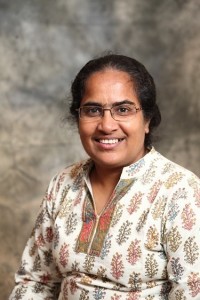Sister Pushpa Joseph, United Board Trustee

Dr. Pushpa Joseph is the Provincial Superior of the Franciscan Missionaries of Mary, Bangalore, India. She taught in Madras University for nine years and is presently the Director of the Centre for Women’s Studies, DVK, Bangalore. She is a United Board Trustee and the co-chair of its South Asian Task Force.
How do you define public theology?
Public theology is any theology that has the concerns of people at its core. It has something to say about the day-to-day struggles of people. It is not merely a theology of consent, but also of resistance, because people can be active agents of change. It analyzes divisions of space, yet it also highlights ways in which liberating powers create new space for marginalized people.
For Christians, theology gives us the tools to interpret Jesus’s message. Public theology has at its center the blood, flesh, and life of people. What is the Eucharist if not this?
Is there a role for public theology in Asian societies?
I see three important issues in the Asian context. First, people have been impoverished but they do not live their lives as victims. They have not forgotten the art of sharing; rather, they open their homes and share the little they have. They do not take a victimized approach but instead find newness in life. Second, with a plurality of traditions in Asia, Asians have the capacity to create relationships across faiths and cultures. The third issue is the caste system, especially as it exists in India. Caste-based divisions are communicated subliminally, in traditions, and are passed on through generations. They are presented as natural and even divine, as though this is the way that God has ordained things to be.
Public theology asks questions that critically challenge reinforcing structures that are not liberating, or perpetuate injustice, or refuse to make available the promise of life and the Gospels. It is critical, prophetic, and creative. It calls us to be open to the positive resistance found in everyday practices of marginalized people
Is there a relationship between higher education and public theology?
In the Indian context, knowledge is not merely a channel to power but a journey to genuine wisdom. And Proverbs tells us that wisdom is like laying a table that is full of bounty and open to all. Yet higher education is becoming more competitive and consumeristic, more expensive and specialized.
Education must make students socially conscious and socially responsible to the masses. If the traditional definition of theology is faith seeking understanding, then the definition of public theology is faith seeking dialogue and compassionate relationships. So in this way, education can become a path to freedom.
(First published in Horizons, June 2015)
